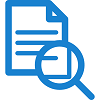ALTP Project: planning workshops to ensure project ownership by stakeholders
The exercise of the planning workshops organised in Côte d’Ivoire and Ghana in November 2019, with the authorities concerned and relevant civil society actors, involves analysing the relevance of the activities proposed by the project to fight against human trafficking in the Gulf of Guinea; identifying complementarities with other projects and between stakeholders; setting the priorities; and, finally, proposing deadlines and specific recommendations for an effective implementation of the activities.
The results of this work will make it possible to tailor the project activities to each context, while ensuring that each stakeholder takes ownership of the project. Following these planning workshops, national launch meetings will be organised in each country before an event is held at regional level, which will gather all the partners in Abidjan in the first half of 2020.
A participatory methodology
Each workshop has a short format: one and a half days and a participatory and inclusive methodology. Following a general presentation of the project to fight against human trafficking in the Gulf of Guinea, three working groups are formed to reflect the project components: institutional strengthening, strengthening of the penal chain and protection of victims of human trafficking. Questions concerning regional cooperation are addressed in a crosscutting manner in the three groups. The outcomes of the discussions are subsequently shared in plenary to open up the discussions to all the partners.
Prevent, protect, prosecute ❗️Workshop on support to the fight against #humantrafficking in the states of the Gulf of Guinea in process @expertisefrance pic.twitter.com/hInGSEjG4s
— European Union Ghana (@EuropeInGhana) November 13, 2019
In Côte d’Ivoire, there was a large turnout for the workshop organised in November by State actors from the various ministries (Ministries of Solidarity, Justice, Security, Women and Children and the Department of Ivorians Abroad), but also by local civil society organisations, international organisations, such as the International Organization for Migration (IOM) and United Nations Office on Drugs and Crime (UNODC), and technical and financial partners.
The project to support the fight against human trafficking in Gulf of Guinea countries (Guinea, Côte d’Ivoire, Ghana, Togo, Benin, Nigeria) started in January 2019. It aims to support the authorities and civil society in 6 Gulf of Guinea countries for the various aspects of the fight against human trafficking: strengthening of institutional and operational capacities, law enforcement, protection of victims and regional cooperation. It is financed by the European Union[1] with cofinancing from the French Ministry of the Economy and Finance and the French Ministry for Europe and Foreign Affairs and is implemented by Expertise France.
More about the project to support the fight against human trafficking in Gulf of Guinea countries (TEH)
[1] The project is financed by the EU Emergency Trust Fund for Africa for stability and addressing root causes of irregular migration and displaced persons, and is cofinanced by the supervisory authorities of Expertise France for the activities implemented at national level in Togo and Benin (countries not directly eligible for the Trust Fund).

